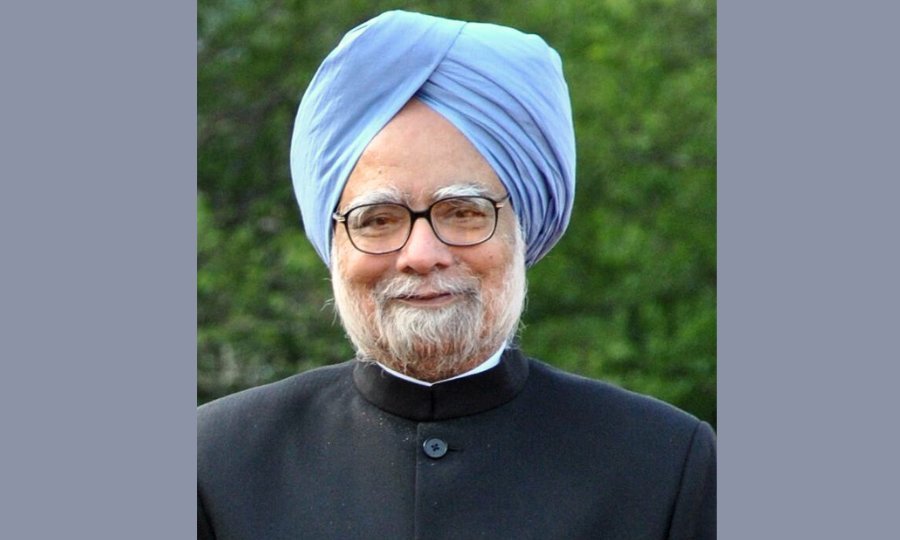Manmohan Singh: No Hate Despite Losing Grandfather in 1947
'Mother Safe, Father Killed': The Telegram Received by His Father During Partition
December 28, 2024
Dr. Manmohan Singh at a SAARC Summit in Thimphu, Bhutan. Photo by Vishal Arora
Dr. Manmohan Singh, India’s former prime minister who died at age 92 on December 26, left present-day Pakistani Punjab as a young refugee during the 1947 Partition and witnessed the bloodshed of that year’s communal violence; yet he harboured no resentment or hate, unlike many of his fellow refugees who went on to show hostility toward India’s minorities.
Residents of his native village in Punjab Province’s Chakwal district, where Muslims make up 99.45% of the population, observed his passing by gathering to mourn at the home of the late Pakistani politician Raja Muhammad Ali, Dr. Singh’s classmate, as reported by The Print.
“Today, we have lost a village head,” Ali’s nephew Raja Ashiq Ali was quoted as saying. “The entire village is in mourning. We feel that someone from our family has died today,” India Today quoted Altaf Hussain, a resident, as saying.
Ali used to call the future prime minister by his nickname “Mohna” when they were young.
Manmohan Singh was born on Sept. 26, 1932, and his ancestral home was in Gah, a village that only gained greater notice when Dr. Singh became Prime Minister of India in 2004. Another settlement called Dhakku, the ancestral village of his wife Mrs. Gursharan Kaur, lies nearby.
The news of Dr. Manmohan Singh’s political elevation caused excitement in Gah. Officials from Pakistan surveyed his old hometown, prompting locals to believe he might soon visit. The Indian government facilitated solar-powered streetlights and a geyser for the local mosque when Dr. Singh became prime minister, as noted by The Print.
Years later, Raja Muhammad Ali managed to travel to Delhi in 2008, meeting with Dr. Singh and his wife. He was accompanied by gifts of soil and water from their ancestral land. Dr. Singh reciprocated with a turban, a shawl and a set of watches.
Journalist Rajeev Shukla, in his book, “Scars of 1947: Real Partition Stories,” recounts Singh’s early life, explaining that in 1947 the family’s property was left behind.
The book also describes how the teenaged Singh lost his grandfather to the violence in Gah. A telegram reading “Mother Safe, Father Killed” reached his father, Gurmukh Singh Kohli. The telegram had a lasting impact on the family.
In the introduction of the book, the publisher, Penguin, describes the tensions during that time.
“In 1947, the Hindu–Muslim clashes had begun, and they became more and more violent with each passing day. At [Manmohan Singh’s] village, Muslims outnumbered all others and as a result, the village had two masjids and one gurudwara. One day, when the tension between the communities was at its peak, it was decided by the elders of the village that they would sit with each other and try to diffuse the tension with discussions,” says the introduction.
“The elders of the village, who were Hindu, Sikhs and Muslims, were called. However, the youngsters of the dominant Muslim community planned a massacre and killed all the Hindu and Sikh elders, among whom was Manmohan Singh’s grandfather who had brought up young Manmohan and of whom Manmohan was very fond. When his grandfather was killed, Manmohan was living with his father in Peshawar.
“… On the one hand, this group of young Muslim men tricked and killed his grandfather and on the other hand, in that very neighbourhood, there was a Muslim family who hid his grandmother and protected her from the bloodthirsty mob.”
Singh’s family subsequently relocated to Amritsar in the Indian side of Punjab, where they attempted to rebuild their lives. Singh had to retake his final school examinations after the original results were never announced due to the tumult. He struggled financially during his college years and he was sometimes forced to skip meals in favour of a chocolate bar while at Cambridge.
Eventually, Dr. Singh earned recognition for his intellect and secured scholarships that enabled him to study economics overseas. He ascended to become the first Sikh to hold India’s prime ministerial post.
Manmohan Singh also became the first leader after Jawaharlal Nehru to win re-election following a full term. His extensive government service includes roles as India’s Finance Minister, the Leader of the Opposition in the Rajya Sabha, the Governor of the Reserve Bank of India, and the Chief Economic Advisor, among other positions.
Dr. Singh served as India’s prime minister concurrently with Nawaz Sharif, who was the prime minister of Pakistan. While Sharif visited India, Singh never returned to Pakistan, despite receiving official invitations.
Punjab finance minister Manpreet Singh Badal, quoted in The Indian Express, mentioned that Singh once referred to “painful memories” as part of the reason he never went back.
Like numerous others, Dr. Singh and his family suffered in one of the most traumatic events in the subcontinent’s history, which involved large-scale violence and the mass migration of people across the newly drawn borders. The estimates of the number of deaths suggest that between 200,000 and 2 million people died on both sides of the border as a result of the communal violence.
However, Manmohan Singh was never known to express hatred toward any community. In fact, he is recognised for his spirit of admission and reconciliation. In August 2005, about a year after taking office, Dr. Singh issued an apology in the Lok Sabha for the 1984 violence against Sikhs, in which some leaders of his party, the Congress, were implicated.
In contrast, several other politicians and high-ranking officials who were born in what is now Pakistani Punjab and migrated to India after witnessing communal bloodshed regrettably became associated with further violence on the Indian side in the decades that followed.

